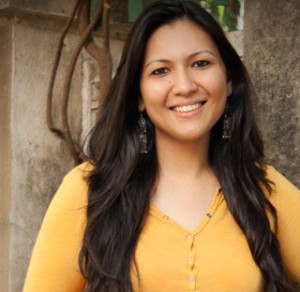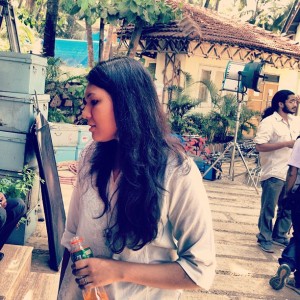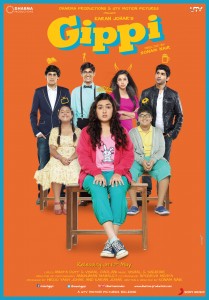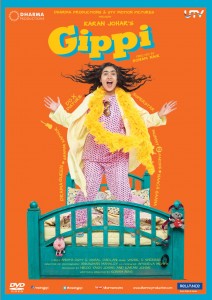 We have a special treat just for you! Sonam Nair, director of the fabulous Gippi, has taken keyboard in hand and written a great blog post about directing and surviving making her first film! It was so cool we had to share it with you!
We have a special treat just for you! Sonam Nair, director of the fabulous Gippi, has taken keyboard in hand and written a great blog post about directing and surviving making her first film! It was so cool we had to share it with you!
Making (And By That I Mean Surviving) Your First Film
There are things people tell you, and things people just let you find out on your own. When I decided that I would like to direct films for a living, I was 13 and had no idea what a director actually does. Now, after having directed a film, I feel like I know only about a 10% of what it means to be a director. I guess it’s better than zero!
So, I thought, maybe I should do something no one did for me- write about what you might think making a film is like vs what actually happens.
The Idea
If you start off thinking you’ll make a film that’ll bring Shah Rukh Khan and Aamir Khan together finally, that’s set in New York with one song in Paris and one in Switzerland, with Kareena, Katrina and Deepika and an item number by Priyanka, chances are… your film is not going to get made. You need to start small. You haven’t made a film before, so it’ll be easier for a producer to trust you with 5 crores instead on 50.
Also, don’t write a script that you think will be a hit and therefore get producers interested. Write what you are most passionate about, because you only get to do that in your first film. After that, you’ll get polluted with the ‘business’ of movies and stop thinking only from the heart. Write from your life, your experiences, your world- not a script that anyone could have written. One of the reasons I got to direct my film was because it was so personal that it was obvious that I should be the one to make it.
After the First Draft
Don’t think that once you’ve typed the words ‘The End”, the script is ready for the world to see. It’s not. If you want to make a film, chances are you have been working in films for a few years and have a few friends in the industry now. So give out the script to a select few of these- your fellow ADs, maybe an editor you got friendly with during the post-production of your earlier film, maybe a dialogue writer you found interesting. Just make sure you have registered your script and mention the fact that you have before giving it out. Take their advice, write a second draft, then give that out to more people. Be very careful about people’s responses. If they’re being generic and polite, they might not have liked it. By the time you’ve heard feedback from about 10 people, you’ll have a pretty good idea of whether the script is working or not. If you think it’s working, give it out to someone you respect. The director of your last film, an actor you got friendly with, another scriptwriter- someone in the power to get your film to the next level. If they love it, you know you’ve got something there.
Meeting Producers
I was extremely lucky that the first producer I went to said yes to my film, but that might not always happen. It helps if you have someone backing your script. An actor, another director, someone close to the producer, someone whose opinion is important. If you don’t have that, then your script will first go to the script-reader, and that’s a very long and unreliable process. So make sure you get someone on your side before you go to producers.
Don’t go to several people at once. The industry is small and you don’t want people talking about your double-dealings. Go one by one, starting with whoever you think you have the best chances with. It’s always helpful if you’ve been working for the same production house for a few years instead of hopping around. But often, people work with one house and get produced outside it- so there’s no one formula. If a producer says he likes your script but wants more time to think about it, give it a couple of months and then ask if you can show it to other producers. You don’t want to get stuck for a year and then get rejected. Always keep your options open.
If you get your project greenlit, congratulations! You might want to celebrate and enjoy it, but you’ll probably enter a state of panic. The reality that you’re actually going to make a film is terrifying. You’ll think of everything that can go wrong. You’ll start worrying about your health. You’ll start drinking green tea and driving more cautiously. Let this phase pass. Don’t make any rash decisions about the film till about 2 weeks after it’s been picked up. Then- go all out! Start putting your team together- your team can make or break the film. Meet as many people as you can. Don’t think some people have too much experience and some too little. Meet whoever you think is talented, pitch to whoever you would love to work with. You might hear a few no’s but so what? You got a Producer to say yes, and others will follow soon. Don’t leave room for regret. I always thought my film was too small for a lot of people in the industry whose work I admired, and now I wish I had at least met them. Even if they can’t do your film, each meeting will make you a little wiser, and you might get great tips from the people you admire. One important thing- be humble. You might be the director, but these people have a lot of good work behind them- so learn from them. Finally, take people who respect you and won’t overstep your position. I have heard of many cinematographers or actors or editors who try and take over the film, thinking the director doesn’t know anything. Don’t let your film slip away from your fingers.
Putting It All Together
Now that you’ve got yourself a Cast, a Cinematographer, a Production Designer, a Costume Designer, a Music Director, and a First AD, it’s time to bring everyone together and share your vision with them. Don’t doubt yourself at this point. You have written the script, and you know more about it than any of them do. But this time is more crucial than people might think- because it’s very important that everyone is on the same page. You might think they get it, and they might think they get it- but everyone might be making their own movie in their heads. So… extra-simplify! Don’t talk about things… SHOW them. Make a giant folder of references. Put in everything you can think of- the color of the fabric you want in this scene, the size of the kettle you want in that scene, the way you want sunlight to fall on the actor’s face in the other scene. Nothing is too small to put in here. Put videos, songs, pictures, websites, artwork, whatever you can find. I used a lot of my pictures from childhood to give everyone a sense of the emotional world of the film. Be open to suggestions at this point, it’s only talk so just let it flow. Let others bring their own references and see if they’re close to yours or not. Meet your HODs (Heads of Departments) as often as you can. Read every scene with your actors, once, twice, three times. If you have time, make storyboards. One thing though- don’t let anything you decide at this point become too rigid in your head. Everything will change when you actually shoot things, but this prep will not go to waste, believe me.
Shooting
Easily the most exhilarating part of the whole process, and also the most harrowing. You might not sleep before the first day of your shoot, but try not to over-think it and put too much pressure on yourself. Start with the easiest shots first. I did a whole day of inserts when I began. Hand on clock, Object on table, Sign on door. It really helped me get into the zone. Everyone is finding their groove so don’t expect perfection straightaway. Just concentrate on keeping a good environment on set, because once that is in place, work will happen smoothly from here on. Don’t let fear, confusion or frustration spoil your mental peace. If you feel any of these brewing, take 5 minutes off. Remember, you have all the answers, and there is no right or wrong. Plus, you have a team to help you out. And don’t be afraid to admit that you’re not sure about something or can’t figure it out. It’s better to ask for help than make the wrong choices.
The most important thing to remember while shooting is that nothing will go as planned. Start with that, and you won’t be thrown off by the million problems that arise. Your job is to make the best of any situation and keep the show going. Don’t compromise on everything the first time a problem crops up, but also keep in mind that you’ll have to let go of a few things to get the rest done. It’s good to have a backup plan, especially on problematic days with lots of background actors or heavy equipment. However, when you do solve the problem and get the shot, it’s the best feeling in the world! So work towards that.
Not to be an aunty about it, but try and recuperate after the shoot on your own. Don’t hang out too much with the cast and crew. You need to brew over the day’s shoot and mentally prepare yourself for the next day. No one else is under the same pressure you are, so even if you hear everyone talking and laughing down the hallway, resist the temptation and go to sleep! You need to rest your mind, and cut off for while.
One tip- you should review your work during shoot. Keep an editor on set to put together rough edits of the scenes you shoot- it’ll help you a lot in the long run. Even if you see the scenes every 3-4 days, just watching the scenes will help you see the drawbacks while you can still fix them. If your gut says that a scene isn’t working, try and reshoot it while you’re still at that location. You might not get to go back once the film is in post-production.
And lastly, don’t forget to ENJOY YOURSELF! Laugh when you’re shooting a funny scene, cry when you’re shooting an emotional one, and dance your butt off when you’re shooting songs. If you don’t feel it, how will you make others feel it? You won’t get to shoot another film for a long time, so make the best of these days!
What Have I Done?
 Once the shoot is over, the most nerve-wracking phase begins. When you look at what you’ve shot, you’ll invariably think that everything looks horrible and nothing is working and that you’ve ruined your film. Relax. Cut off for a while. Let your editor go through the footage, assemble some scenes, try and get all the beats right- while you take a mini-vacation. Then come back with fresh eyes and look at the footage. Focus on getting each scene working first, and then worry about the length or scope of the entire film. Once you’re more or less satisfied with each scene, then put them all together and watch the whole film. This will make new problems stand out, but most things can be fixed on the edit. Don’t look at scenes bare. Put reference background music wherever you feel the need to. Don’t hold back with the music- there’s no copyright issue yet so go all out! Later, you can help recreate the same feeling with your Background Music Director.
Once the shoot is over, the most nerve-wracking phase begins. When you look at what you’ve shot, you’ll invariably think that everything looks horrible and nothing is working and that you’ve ruined your film. Relax. Cut off for a while. Let your editor go through the footage, assemble some scenes, try and get all the beats right- while you take a mini-vacation. Then come back with fresh eyes and look at the footage. Focus on getting each scene working first, and then worry about the length or scope of the entire film. Once you’re more or less satisfied with each scene, then put them all together and watch the whole film. This will make new problems stand out, but most things can be fixed on the edit. Don’t look at scenes bare. Put reference background music wherever you feel the need to. Don’t hold back with the music- there’s no copyright issue yet so go all out! Later, you can help recreate the same feeling with your Background Music Director.
Once you have a satisfactory first cut, ask a few people close to you to give some feedback on it. Don’t invite the whole world yet, the film is at a vulnerable stage and you don’t want people to form rigid opinions about it yet. If your friends have more or less the same few pointers, work on that, and then call them again. If they seem satisfied, start calling in more people. I called in hoards of people of different ages, professions and walks of life. Sometimes they’ll give you bizarre feedback, but you’ll find out the fundamental problems if they keep coming up in every screening. And every now and then, someone gives a brilliant suggestion that can swing things around! Don’t let criticism get you down, it’s better to hear things now and fix them than hear them later once the film has released.
Deadlines and Madness
Once your edit is locked, a period of complete chaos begins. Even if you do everything on time, you cannot account for the 100 new things that crop up, and of course everything has to be done NOW and done PERFECTLY. There is background music, DI, VFX, Sound mixing, Dubbing, Subtitling, Censoring, Publicity, Trailers (theatrical trailer, music promos, dialogue promos, 30 seconder, 20 seconder, 15 seconder), DEATH! You’ll have to take a hundred calls a day from things like the order of the opening credits, to which dialogue promo should go out first, to what your actors should wear in a last minute publicity shoot, to what the font of the ‘intermission’ should be like. It’s exhausting and you don’t have time to dilly-dally, so you just have to trust your instincts and keep ticking off the boxes. There’s no point in trying to be healthy, or get enough sleep during this time. You’ll probably skip lunch every single day, smoke a pack of cigarettes even if you’re not a smoker, and have 2-3 tearful emotional breakdowns. Just remember to keep going, no matter what. The end is near and your very own film will release all over the country!! That’ll make it all worth it.
Looks Like We Made It!
Your baby is out! You’re a mother now! (Yes, even the men!) All that buildup and hard work and emotional trauma, it has all been for this one day, right?! What happened? What was the opening? What are the reviews? What was the overseas response? What does my producer think? What do I do now? CALM DOWN. Don’t sit and think that your world is going to change the day your film releases. It’s not. If you’re very lucky, you’ll go to the theater and see a house-full board and hear people laughing and clapping inside. But don’t make this day about that. Make it about taking your friends and family to watch the film. Your friends will whistle when your name comes on screen and your parents will cry every 5 minutes, filled with pride and joy. That is what will make this day special. Or go alone and buy a ticket for your own film. It’s the best feeling in the world. Take the day to pat yourself on the back for having done what thousands of people yearn to do in this country. Go watch it with a real audience everyday. Feel your heart swell up with pride every time they laugh or cry. That’s what making films is about, right?
If your film does well, you’ll get calls and texts from people in the industry. You’ll get invited to a few parties. You’ll get nominated for some awards. If it doesn’t do well, you’ll get a lot of people saying ‘Oh you made that film? Sorry, I haven’t seen it yet but I’ve been meaning to catch it.’ You’re not an actor, so no one will recognize you on the street and tell you whether they liked your film or not. Whatever response you get from the general public will be limited to Twitter and Facebook and Youtube comments. After a couple of months, people will move on to the next crop of films and yours will be one of the many films that came out that year. Either way, your life won’t change drastically. You might move to a bigger apartment or buy a new car, but the money will run out soon, so you’ll have to be careful with it.
The few weeks after the film’s release are the worst. Your hectic life suddenly feels empty. You stop getting hundreds of calls a day about deadlines and requirements, and the phone occasionally beeps when someone sends you a nice message about your film. Or VMCallertunes wants you to buy a new ringtone. Take this time to take account of everything you learned from this film, what your strengths and weaknesses are, what you would like to do differently next time around, and thank the lord that your film actually made it to the theaters! Then… stop thinking about it. You’ve thought about your film for a looooong time now, and you need to stop. Go away somewhere. Meet new people who have no connections to films. Read books. Watch entire seasons of TV shows in one day. Wash yourself off the film, so you can start thinking about the next one with a clean state of mind.
Aftermath
 Making films is, I think, the best job in the world. I have never been as happy as I was during the making of my film. Every problem seemed small, every setback manageable, when I just sat back and thought, ‘Wow, I’m making my own film!’ But I’m not going to lie, it really takes a toll on you. You put everything you have in your first film- blood, sweat, tears and all your heart. And yet, to the rest of the world, it’s just another film. It might be a good film, a successful film, but it isn’t the most important film of their lives. Don’t let that deter you. Your first film should never be about the destination, because it will be the journey of a lifetime. And you only get to go through it once. So if you don’t put everything you’ve got into it, you’re going to regret it for the rest of your life.
Making films is, I think, the best job in the world. I have never been as happy as I was during the making of my film. Every problem seemed small, every setback manageable, when I just sat back and thought, ‘Wow, I’m making my own film!’ But I’m not going to lie, it really takes a toll on you. You put everything you have in your first film- blood, sweat, tears and all your heart. And yet, to the rest of the world, it’s just another film. It might be a good film, a successful film, but it isn’t the most important film of their lives. Don’t let that deter you. Your first film should never be about the destination, because it will be the journey of a lifetime. And you only get to go through it once. So if you don’t put everything you’ve got into it, you’re going to regret it for the rest of your life.
Now, I’m going through the immense anxiety of starting my next project. Putting too much pressure on every little idea, second-guessing myself at every step and analyzing everything way too much. I yearn for the simplicity of when I did this the first time around, when just getting the film made was the most important thing. Cherish that innocence, it gets snatched away pretty soon. But whatever happens next, I can always put my Gippi DVD on, watch my first baby come alive and smile that I got to do this. And no one can ever take that away from me.
With all my love and wishing you all the luck in the world,
Sonam Nair.










